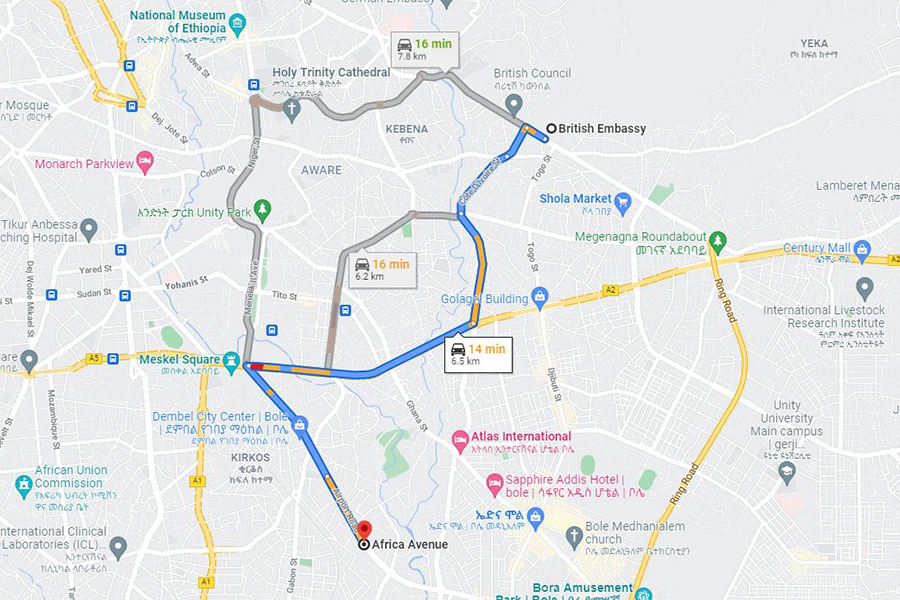
Oct 26 , 2019
By Dawit Wondimagegn
Our ability to reconcile the different and opposing types of leaders in our mind will determine who we will decide to follow and also who we will feel safe enough to trust, writes Dawit Wondimagegn (MD) (dawitwondimagegn@gmail.com), associate professor of psychiatry at Addis Abeba University’s School of Medicine and chief executive director of Tikur Anbessa Hospital.
Reality is prone to illusory manipulations. Leaders, in general, are torn between the poles of reality and illusion. Somewhere in between must be where vision resides. This is all an attempt to make sense of a psychological bubble. What is real? And for whom?
Dealing with reality is a tough task. We are living in uncertain times. We are not sure what happens next. The future, which is never there, has ceased to provide its pseudo sense of hope. That there is a future and we will be in it are nice ideas with no traction in reality. We seem to be surprised to wake up to the fact that the entire constructed world around us is a mere idea.
The very existence of people, friends and places is fragmenting in front of our own eyes. The way we are bombarded with endless stimuli is triggering our worst fears and anxieties. In such times when all the unconscious is out there with no inhibition, our internal instinct is wired in such a way that we look up to leaders, and at times we actually look for them to save us from all the fear.
Leadership is a tricky thing. It is the product of our wild, creative and developing mind. The trick is that leaders are our own inventions. They are created by our various states of mind. A religious leader and a political leader, for example, are created by two different states of mind, spiritual and material states of mind. As a result, we have the capacity to hold different types of leaders in our mind at the same time. This is the source of both the comfort and despair that occupy us every time we think about leaders.
Our ability to reconcile the different and opposing types of leaders in our mind will determine who we will decide to follow and also who we will feel safe enough to trust. One, of course, has to bear in mind that one leader could have multiple qualities that would add to the complexity.
If we are the inventors and followers of leaders, then it is a mystery that we almost always feel a sense of strangeness toward them. When we look at leaders, we see complete strangers. They do not seem to come from our own backyard. Some seem to have lost their entire reality testing. They engage in their own "cow in the sky" fantasy show. While others are lost in the trenches of reality that they forget the presence of others, let alone the truth that they are leaders of people.
We see self-proclaimed leaders calling themselves with curious names like "influencers," "motivators," "opinion leaders" and the like. A deeper look shows that they influence for their own interest, motivate for achieving their own goal and they are highly opinionated with no real opinion.
These leaders are everywhere. They exist in the abstract, and they feel that they have the answer to the most important questions of life. They speak with the absolute belief that they know everything and with equal arrogance that nobody else does.
They act like the world was created when they showed up. In a way, that is true for all of us, but under normal developmental circumstances we are supposed to out grow it. One of our childish convictions is that the world is created by us and for us, then by our parents for us and then of course reality and the constructed world kick in.
Self-appointed and self-proclaimed leaders either have an arrested maturational development at an earlier stage or have regressed to a previous developmental stage. Technology may, inadvertently, have created a space for such regression where people may have free rein without the constant parental monitor that shapes and creates a mature individual.
We see illusory leaders as well. Their sole existence seems to be to constantly misperceive reality, misrepresent truth and misguide their followers. These are the most fascinating bunch, because you cannot tell why their perceptual depth is so distorted. The essence of time is lost to them. The simple notions of past, present and future are merged into one. When they talk about the past they do it as if they were in it. The future does not exist for them, and the present is constrained to their size.
They have no problem with reality, but they pick, choose and distort as they see fit to their purpose. Their interpretation of history is their own. They are stimulated by sensation, but they confuse the person for the shadow.
Their development seems to be arrested at the make-believe stage. They will believe and force others to believe in what they think is true, effectively depriving their followers the freedom to trust their own sensory experiences.
There are also grounded leaders. I have sympathy for them. I assume that most leaders in our country will fall under this category. Reality has overwhelmed them. They worry about the immediate environment. They cannot shift their gaze to the future for fear that the ground on which they are standing will swallow them. They are paralyzed by the limitations around them on one side and the collective expectation on the other. Their most important skill is tinkering, fixing the ground at times literally. These are leaders who got "parentified" quite early in their development.
Considering the political history of our country over the past several decades, this should not come as a surprise. The best and the brightest of the nation have gone through unexplainable tragedy. This has left a huge void to be filled with children. This must have forced the creation of grounded leaders - leaders who have energy but lack the know-how. They lead with what they know, and there is the possibility that they may have led the nation into the ground, all with good intention. These leaders suffer the most, because they do not have followers. They have on-lookers.
The rare species of leaders are the visionaries. They are a rare breed in our country for a good reason. They have the habit of showing up at the wrong times when people are neither ready nor interested in accommodating them. They are always in danger of leaving their followers behind, as some would have trouble sharing the vision. They see beyond the ground reality, so they are the opposite of the grounded leaders. They do not only see the future, but they run toward it and crash.
A leader’s vision may end up being a follower’s nightmare in the transition. The reality of leadership is such that you cannot lead without people. Where people are will determine where your vision can go. One may go a longer way with no vision at the right time than with the right vision at the wrong time. Extreme visionaries may have stayed in the fantasy world of childhood where one child could play multiple roles at once. The omnipotence of infancy will sneak into adulthood. The narcissist child in all of us may show up as a visionary leader.
All sorts of combinations and permutations of the various types is possible. One may also add more types and categories. What I did is just for the sake of a mental exercise to help me settle my anxiety about the leaders we see in our everyday life. I also firmly believe that we all are leaders one way or another, so leaders are not the just "the other" we follow. My wish is that we will see more grounded visionaries.
Who are grounded visionaries? Grounded visionaries are the way to go if we are to transition to a civilized society. They will have the essence of time and understand that in the infinite time we are finite beings. The present is as much the consolidation of the past as it is the springboard to the future. They recognize that stagnation through compartmentalization of time is a regression.
They also understand that ground realities are developmental. We may be able to speed up development, but we cannot out jump reality. Just because we live in the age of information and disruption, it does not mean that we can disrupt our way into prosperity. If it took the industrial world a few centuries, it is going to take us some time, because development is incremental even with the help of technology.
The great thing about grounded visionaries is, as much as they are grounded, they are not fixed to the ground. Most importantly they have the capacity to differentiate between what can be changed from what needs to be tolerated. Their most significant attraction will be that they will have no problem in getting followers. People will follow them, some for the ground, some for the vision, some just for the ride and some just because they do not want to be left behind. If we all are in a bus that is grounded to reality and have a destination, the bumps are temporary, but we are going to a good place. If the drivers are trustworthy. Who would not board such a bus?
But how do we reach there? What should happen for us to invent grounded visionaries? We are the innovators of our leaders. When they go bad, we have some hand in it. We do it by omission, commission and indifference.
We are the ones who can make it right. What power do we have? Are we not the helpless and innocent victims of bad leadership?
We have a lot more power than we think. We need to wake up to the reality that we are living in a postmodern world where power is no more only hierarchical but circulates within and among us. We permit what is done to us mostly without knowing it.
Most of our current problems are basically a result of bad and unaccountable leadership. Leaders do whatever they want and what do we do when they continually misbehave?
We never question them. Why? We never ask them what gives them the right to monger fear between us. We never confront them with the question: what is in it for them.
When someone is suffering or injured or dies, we have to ask all leaders, but especially the self-appointed ones, what is in it for them?
We all will benefit from challenging them rather than fighting over what they said or did. This probably is one way of creating grounded visionaries: leaders who ensure that the backyard they come from remains safe while they move to the future. Even with an ambitious jump, one is always bound to land.
PUBLISHED ON
Oct 26,2019 [ VOL
20 , NO
1017]


Fortune News | Mar 19,2022

Delicate Number | May 28,2022

Fortune News | Sep 18,2021

Fortune News | Dec 11,2021

Fortune News | May 01,2022

Radar | Nov 27,2021

Fortune News | Apr 03,2021

Featured | Sep 26,2021

Year In Review | Jan 04,2022

Radar | Sep 10,2021

My Opinion | 131674 Views | Aug 14,2021

My Opinion | 128041 Views | Aug 21,2021

My Opinion | 126002 Views | Sep 10,2021

My Opinion | 123625 Views | Aug 07,2021

Dec 22 , 2024 . By TIZITA SHEWAFERAW
Charged with transforming colossal state-owned enterprises into modern and competitiv...

Aug 18 , 2024 . By AKSAH ITALO
Although predictable Yonas Zerihun's job in the ride-hailing service is not immune to...

Jul 28 , 2024 . By TIZITA SHEWAFERAW
Unhabitual, perhaps too many, Samuel Gebreyohannes, 38, used to occasionally enjoy a couple of beers at breakfast. However, he recently swit...

Jul 13 , 2024 . By AKSAH ITALO
Investors who rely on tractors, trucks, and field vehicles for commuting, transporting commodities, and f...

Jun 28 , 2025
Meseret Damtie, the assertive auditor general, has never been shy about naming names...

Jun 21 , 2025
A well-worn adage says, “Budget is not destiny, but it is direction.” Examining t...

Jun 14 , 2025
Yet again, the Horn of Africa is bracing for trouble. A region already frayed by wars...

Jun 7 , 2025
Few promises shine brighter in Addis Abeba than the pledge of a roof for every family...

Jun 29 , 2025
Addis Abeba's first rains have coincided with a sweeping rise in private school tuition, prompting the city's education...

Jun 29 , 2025 . By BEZAWIT HULUAGER
Central Bank Governor Mamo Mihretu claimed a bold reconfiguration of monetary policy...

Jun 29 , 2025 . By BEZAWIT HULUAGER
The federal government is betting on a sweeping overhaul of the driver licensing regi...

Jun 29 , 2025 . By NAHOM AYELE
Gadaa Bank has listed 1.2 million shares on the Ethiopian Securities Exchange (ESX),...